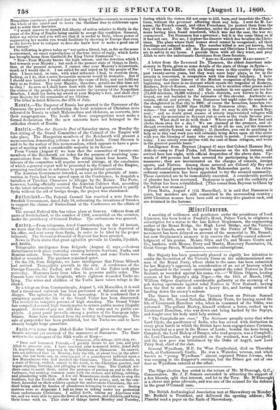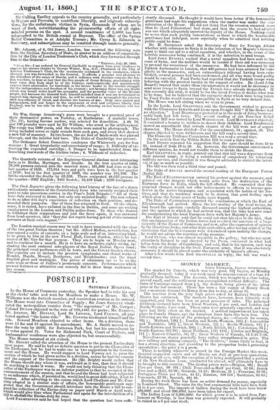311ImIlnurung.
A meeting of noblemen and gentlemen under the presidency of Lord Llanover, has been held at FendalPs Hotel, Palace Yard, to originate subscription for a statue to the late Robert Stephenson, the engineering author of the Menai Bridge, the High Level Bridge, and the Victoria Bridge in Canada, soon to be opened by the Prince of Wales. This movement has been delayed on account of the memorial to Mr. Brunel; but now Stephenson's memory is to receive the hardly-earned acknow- ledgment of his genius. Messrs. Glyn and Co. and Messrs. Coutts and Co., bankers, with Messrs. Perry and Manby, Honorary Secretaries, 24, Great George Street, Westminster, receive subscriptions.
Her Majesty has been graciously pleased to signify her intention to confer the decoration of the Victoria Cross on the undermentioned sea- man of the Royal Navy, whose claim to the same has been submitted for her Majesty's approval, in consideration of an act of bravery which he performed in the recent operations against the rebel Natives in New Zealand, as recorded against his name, viz.—" William Odgers, leading seaman of her Majesty's ship Niger.—On the 18th of March, 1860, William Odgers displayed considerable gallantry at the storming of a pah during operations against rebel Natives in New Zealand; having been the first to enter it under a heavy fire, and having assisted in hauling down the enemy's colours.
The Queen has conferred the Victoria Cross on Private Samuel Morley, No. 201, Second Battalion, Military Train, for having saved the life of Lieutenant Hamilton who, when in command of the Sikhs, was unhorsed. The gallant Morley, himself without a horse, rushed up to Lieutenant Hamilton, who was down and being hacked by the Sepoys, and fought over his body until help arrived.
" The Campbells are come." The Scotsman proudly notes that when Lord Clyde, the pacificator of India, who has served with distinction in every great battle in which the British have been engaged since Corunna, was installed as a peer in the House of Lords ; besides the hero being a Campbell, the Lord Bishop of Bangor, who read prayers, was a Campbell; the Lord Chancellor, who presided on the woolsack, was a Campbell; and the new peer was introduced by the Duke of Argyll, now Lord Privy Seal, chief of the clan.
General Wyndham, M.P. for West Cumberland, died on Thursday week, at Cockermouth Castle. He was a Waterloo veteran, and when known as "young Wyndham" almost captured Prince Jerome, who was escaping in the Emperor's carriage, but the Prince got out of one door as Wyndham entered at the other.
The Sligo election has ended in the return of Mr. M'Donough, Q.C.,1, Conservative. Mr. J. P. Somers succeeded in attracting the support o f , a few liberals,. split that interest, and let in the Tory. Mr. Iff'Donougli. is a clever nisi prius advocate, and was one of the counsel for the defence in the great O'Connell case.
The British Archaeological Association met at Shrewsbury on Monday. Mr. Botfield is President, and delivered the opening address ; Iffr Planche read a paper on the Earls of Shrewsbury.
Sir. Culling Dudley appeals to the country generally, and particularly to Mayors and Provosts, to eontribute 'liberally, and originate subscrip- tions, for the unfortunate victims in Syria, thousands of whom are in want of food, notwithstanding the praiseworthy efforts of all right- minded persons on the spot. A second remittance of 2,5001. has been telegraphed to the British consul at Beyrout. The office of the Syrian Relief 'Committee is at Adelphi TerraceMr. Cyrus R. Edmonds is Secretary, and subscriptions may be remitted through bankers generally.
Mr. Ashurst, of 6, Old Jewry, London, has received the following note from the Sicilian Secretary of State, in answer to an address of congratula- tion by the City of.London Tradesmen's Club, which they forwarded through him to the General-
" Palermo, July 20, 1860.
" Dear Sir—I am ordered by General Garibaldi to request from your kindness to express his sincere thanks to George Walter, Esq., C.C., Chairman of the City of London Tradesmen's Club, for the sentiments contained in the resolution, which through you was forwarded to the General. It affords a genuine real pleasure to the defenders of the cause of liberty, and it inflames with resolute courage the Ita- lian warriors, to hear at last that the free people of Great Britain, proclaiming with loud voice that Italy shall be of the Italians, enthusiastically and unanimously express their admiration for Garibaldi as the heroic leader in the terrible struggle for the independence and freedom of his country ; not because there was any doubt which way would enlist itself the sympathy and the powerful voice of the British people, but because the General feels himself satisfied that if you are determined to support him through thick and thin, he will be enabled to accomplish his mission with less effusion of blood, and shorten the horrors of War. Italy once united and independent, will not forget in the enjoyment of civil and religious liberty that England, was by her side on the day of trouble, cheering on her warriors and her leader."
Sir WM. George Armstrong's guns were brought to a practical proof of their destructive power, on Tuesday, at Eastbourne. A martello tower, (No. 71), having become useless, was selected for demolition. A 40, 70, and 100 pounder were used by Sir William, who acted as the artilleryman. The range was 1000 yards, and the results were noted by photograph. The firing included seven or eight rounds from each gun, and every shot showed a new fall of masonry. In two hours, the six feet of brick-work was pierced through, and the interior laid bare. The Duke of Cambridge was present.
The Ordnance Select Committee condemns the Whitworth gun for four reasons : 1. Great irregularity and uncertainty of range; 2. Difficulty of ex- tracting the expended cartridge ; 3. Danger to be apprehended from the launching rearwards of the friction tubes ; 4. Wildness of richochet.
The Quarterly returns of the Registrar-General disclose most interesting facts as to Births, Marriages, and Deaths. In the first quarter of 1860, 70,396 persons entered into the married state; 101,000 had done so in the last quarter of 1859. 173,914 boys and girls were-born in the last quarter of 1859; but in the first quarter of 1860, the number was 183,206. The births exceeded the deaths by 63,036. There emigrated 48,626 persons in the quarter-9347 English; 3461 Scotch; 33,438 Irish ; 2290 foreigners.
The Cork _Reporter gives the following brief history of the fate of a dozen enthusiastic, members of the Constabulary force who recently resigned their posts to take precarious service in the Pope's Irish Brigade—" All of them were duly conveyed to Rome, but only one enlisted finally. The rest refused to do so after five day's experience or reflection on their position, and de- manded their passports. One of them has returned to Cork. Of the others, some, it is stated, have enlisted in the line in Dublin, and some are seeking employment in the London and Dublin police-force. To those who desired to withdraw their resignations and join the force again, it was answered from head-quarters, that they did not regret having got rid of discontented servants at their own request."
The London musical season may be said to have terminated with the close of the two great Italian theatres ; but Mr. Alfred Mellon, nevertheless, has announced a series of concerts, on a large scale and of an interesting kind, to be given by him in the new Floral Hall, Covent Garden, which he has rented of Mr. Gye for that purpose. They are to begin on Monday next, and to continue for a month. He is to have an orchestra eighty strong, in- cluding the most eminent solo-players of the Royal Italian Opera band; the principal vocal performers still in town, and the Covent Garden chorus. The concerts are to include the greatest symphonies and choral works of Handel, Haydn, Mozart, Beethoven, and Mendelssohn ; and the finest English glees and madrigals. The prices of admission are to be on the same scale as those of Jullien'a promenade concerts. Performances which present features so attractive can scarcely fail to draw large audiences at any season.



























 Previous page
Previous page